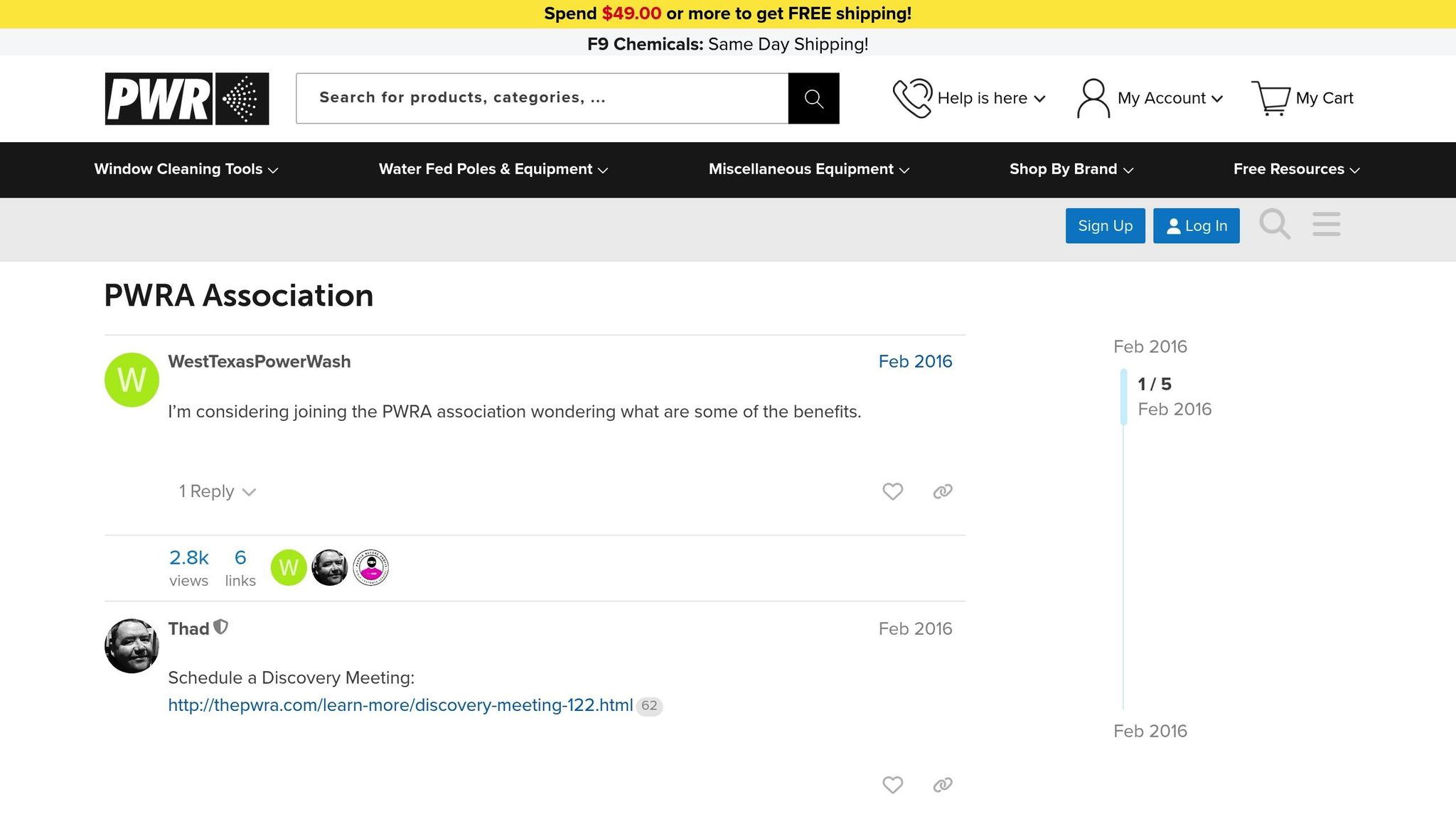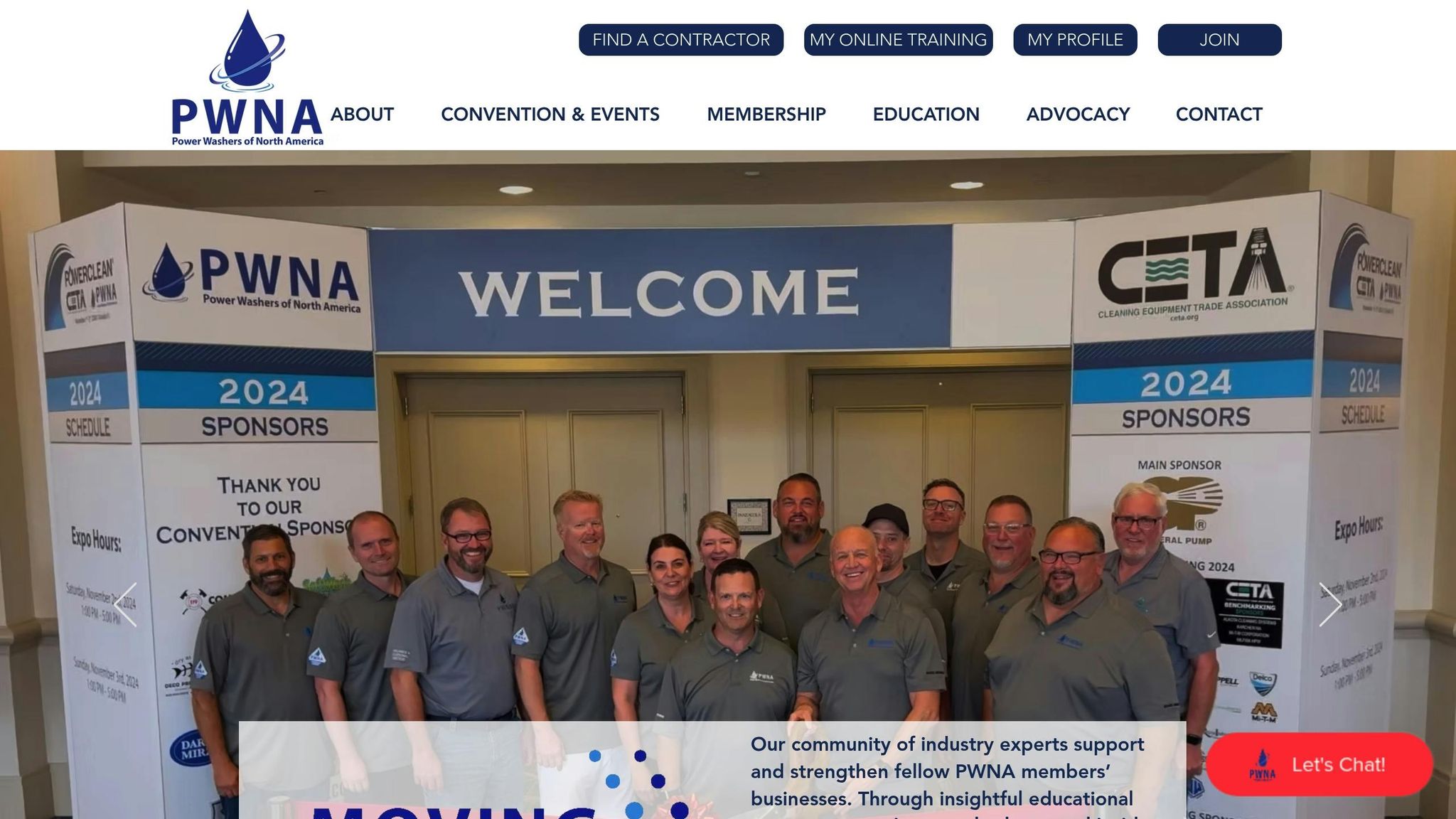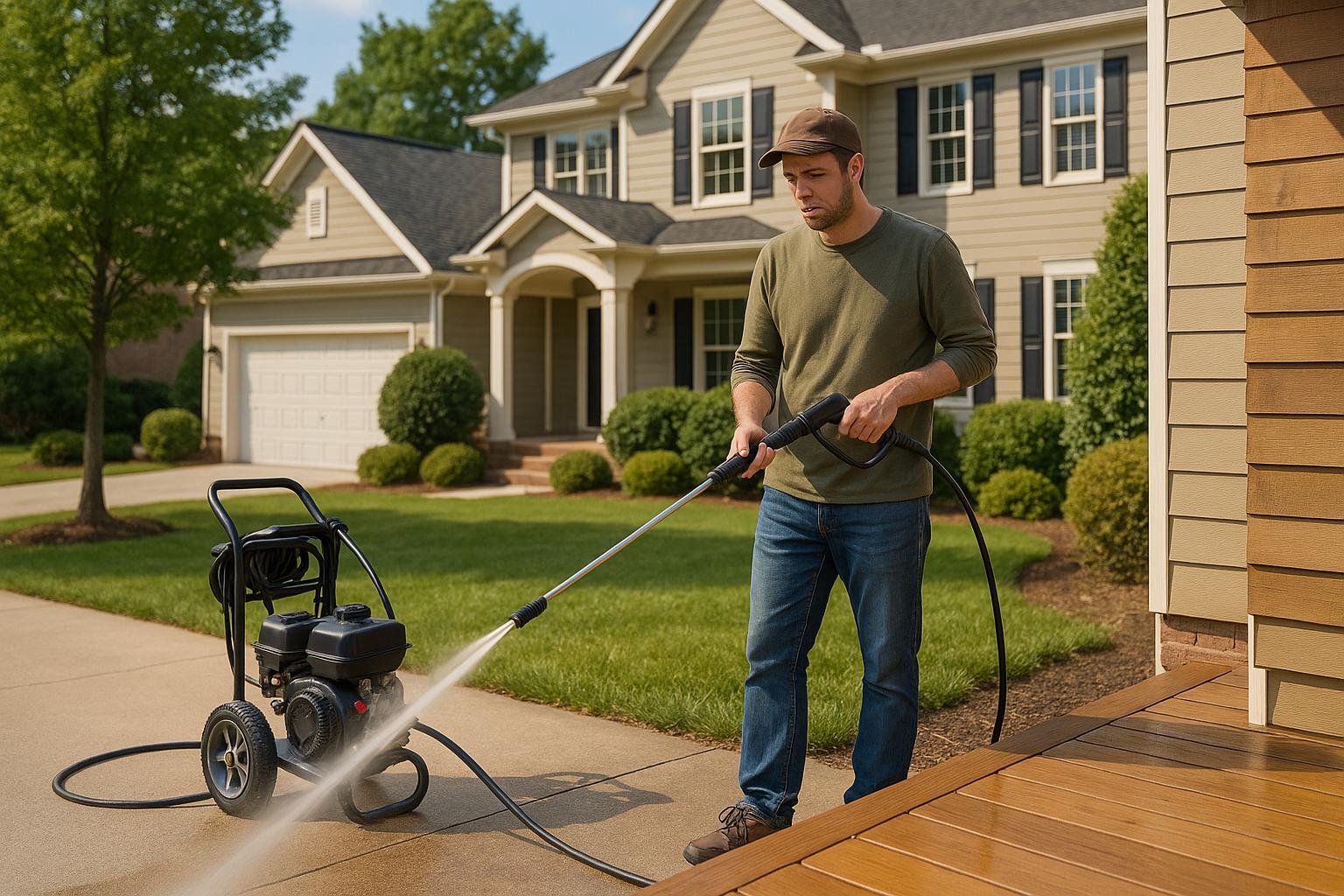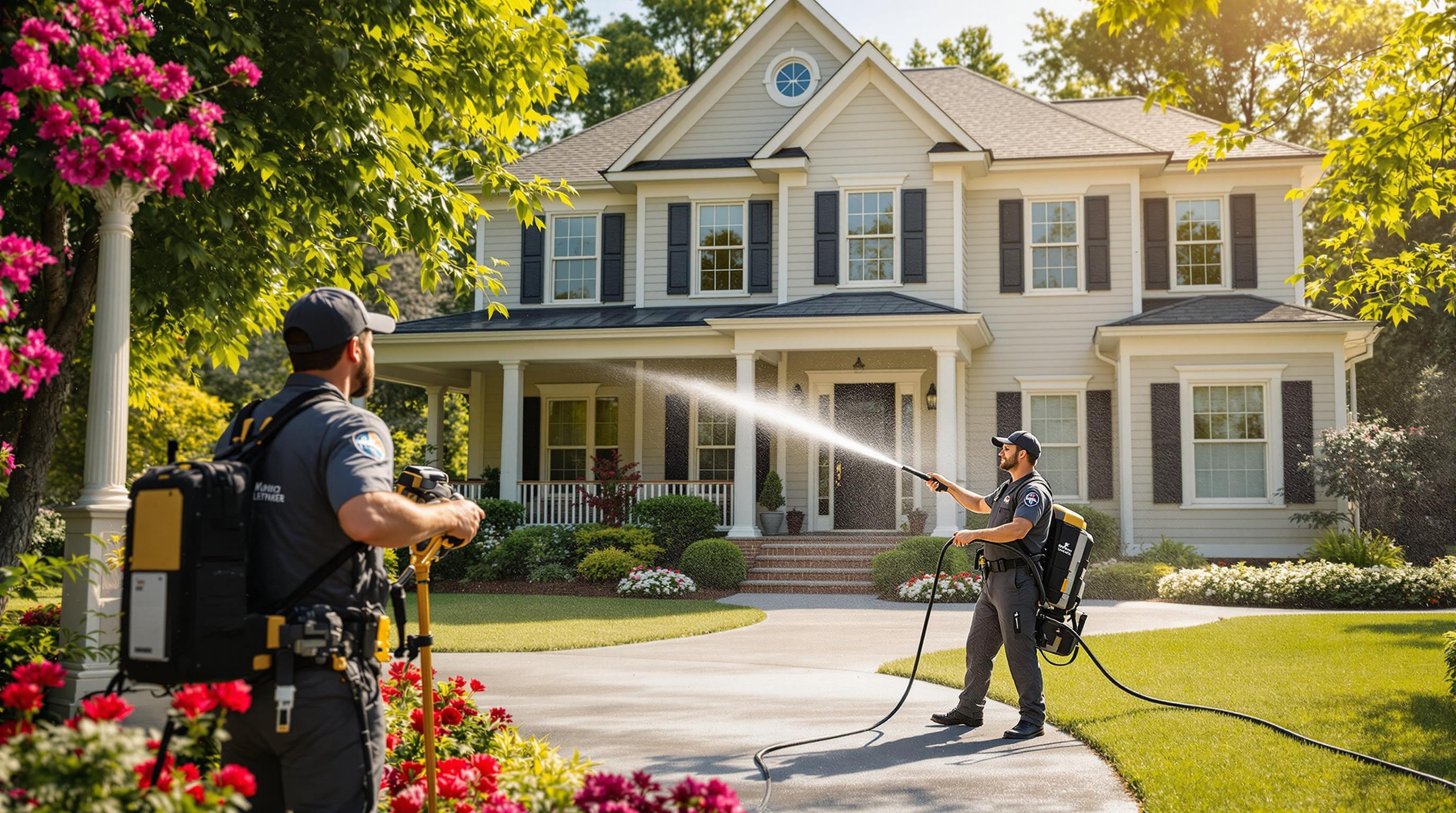Want to become a certified pressure washing professional? Here's what you need to know about the costs involved:
- Total Cost Range: Expect to spend between $1,000 and $2,000 for certification, including registration, training, exams, and additional fees.
- Key Expenses:
- Registration Fees: $199–$599 (one-time).
- Training Materials: $150–$350 (one-time).
- Hands-On Training: $400–$800 (one-time).
- Exams: $175–$275 (renew every 2–3 years).
- Additional Costs: Travel, lodging, equipment rentals, and renewal fees ($95–$195 every 2–3 years).
Quick Comparison
| Program/Provider | Cost Range (Members) | Cost Range (Non-Members) | Renewal Fees | Notes |
|---|---|---|---|---|
| PWRA | $199–$800 | Higher for non-members | Annual fees | Discounts for members |
| PWNA | $595–$895 | $795–$1,095 | $125 (2 yrs) | Includes advanced tracks |
| Industry Schools | Varies widely | Varies widely | Varies | Includes business skills |
Pro Tip: Choose a program based on your career goals - basic certifications for beginners, advanced tracks for experienced professionals, or comprehensive options for business owners. Certification can enhance your skills, boost your credibility, and improve your earning potential.
Are Pressure Wash Courses Worth It?
Basic Cost Elements
The cost of pressure washing certification generally falls into four main categories:
Registration and Application Fees
These fees typically range from $199 to $599. They cover administrative expenses and provide access to the certification platform. Registering early can often save you 10–15%.
Training Materials and Resources
Expect to spend $150 to $350 on training materials, which usually include:
- Digital course manuals
- Safety guidelines and technical documentation
- Video training modules
- Practice test materials
Hands-on Training Sessions
These 2–3 day sessions focus on practical skills, such as:
- Operating and maintaining equipment
- Surface cleaning techniques
- Safe chemical handling
- Compliance with safety and environmental protocols
Examination and Certification Fees
The exam costs $175 to $275. This fee covers both the written and practical assessments, as well as the issuance of your certificate and digital credentials.
| Cost Element | Typical Price Range | Renewal Period |
|---|---|---|
| Registration | $199 - $599 | One-time |
| Training Materials | $150 - $350 | One-time |
| Hands-on Training | $400 - $800 | One-time |
| Exam Fees | $175 - $275 | Every 2–3 years |
Additional costs to consider include travel expenses and renewal fees, which range from $95 to $195 every 2–3 years. Opting for package deals can save you 15–20% compared to purchasing items separately. Overall, plan to spend between $1,000 and $2,000 for the entire certification process.
The next sections will break down costs for specific programs like PWRA and PWNA.
1. PWRA Certification Costs

The Pressure Washing Resource Association (PWRA) offers certification programs with pricing that depends on your membership status and the course you select. Here's an overview of what they provide and the associated costs.
Core Certification Package
This package includes access to a digital learning platform, a safety and operations manual, online training modules, and the certification exam. Members benefit from discounted pricing compared to non-members.
Enhanced Training Bundle
This option adds hands-on equipment training, a guide for advanced chemical handling, a business operations toolkit, marketing materials, and extended access to course content. Membership discounts make this a practical choice for professionals aiming to grow their skills and business.
PWRA certifications combine online learning with hands-on training, ending with a final evaluation. To keep your certification active, you'll need to pay small annual renewal fees and earn continuing education credits.
Additional costs may include travel and lodging for in-person training, equipment rentals for practice sessions, or fees for retaking exams. While the enhanced bundle requires a higher initial investment, it offers extensive training and business tools that can help you succeed in the long run.
2. PWNA Certification Costs

The Power Washers of North America (PWNA) offers professional certification programs at both basic and advanced levels.
Standard Certification Package
The standard certification costs $595 for members and $795 for non-members. This package includes:
- Digital course materials
- Online training modules
- Basic equipment manual
- One attempt at the certification exam
Advanced Certification Track
The advanced certification is priced at $895 for members and $1,095 for non-members. It includes:
- Advanced technical training materials
- Guidelines for compliance with regulations
- Surface-specific cleaning protocols
- Business management resources
- A two-day hands-on training session
- Final certification assessment
Additional Costs
Maintaining your certification comes with some recurring expenses:
- Annual membership dues: $199
- Certification renewal every two years: $125
- Continuing education courses: $75–$150 per course
- Equipment rental for practical training: $200–$400
The certification process typically takes 3 to 6 months to complete, which may influence your overall investment timeline.
Payment Options
PWNA provides several payment plans to make the certification more accessible:
- Pay in full and get a 5% discount
- Opt for a three-month installment plan
- Choose a six-month financing option (credit approval required)
PWNA certification can help professionals secure commercial clients or government contracts that require formal credentials. Many find they can recover their investment within 3 to 4 months through higher service rates and expanded client opportunities.
sbb-itb-8e2a680
3. Industry School Certification Costs
Industry school certifications combine classroom learning, hands-on training, and exam preparation into a single program. These programs typically cover topics like equipment operation, safety procedures, and basic business skills. However, the total cost goes beyond just tuition fees.
Additional expenses often include:
- Insurance for the training period
- Personal protective equipment
- Travel costs for in-person sessions
- Fees for specialized equipment access
Many programs provide flexible payment options, such as installment plans, discounts for early registration, veteran benefits, and group rates. The length of these programs depends on the course’s intensity, but graduates often see better career opportunities.
It’s also important to consider ongoing expenses that come after the initial program:
- Updates to study materials
- Certification renewal fees
- Continuing education requirements
- Training on advanced or specialized equipment
Make sure to carefully review each program’s cost breakdown and weigh it against the potential career benefits.
Cost vs. Benefits Analysis
Certification programs vary in both scope and duration. Some focus on the basics, like safety practices and operational techniques, while others dive deeper into advanced technical skills and business management.
The career benefits depend on your experience level. For entrepreneurs, more detailed programs can help develop both practical and business skills. Experienced professionals may find advanced courses useful for landing higher-paying contracts. For beginners, basic certifications can serve as a cost-effective way to enhance their credentials.
When choosing a program, consider payment plans, discounts for early enrollment, and group rates to align with your budget and career goals. Instead of viewing certification as just another expense, think of it as an investment in your future.
While upfront costs may seem high, the long-term advantages often outweigh them. Certification boosts your credibility and safety knowledge, which can lead to better earnings and career opportunities. Many reputable companies - like Pressure Washing Cary NC - actively seek certified professionals, highlighting the value of quality training.
Summary and Recommendations
When selecting certifications, consider both your budget and career objectives. Advanced PWNA certifications provide a mix of technical and business training, building on your current knowledge and skills.
Here’s a breakdown of recommendations based on experience:
Entry-Level Professionals
- Focus on basic safety and equipment training with payment flexibility.
- Obtain essential operational certifications.
- Look for starter programs that include hands-on experience.
Experienced Operators
- Pursue specialized certifications to deepen technical skills.
- Consider programs that also include business development training.
Business Owners
- Opt for comprehensive packages that combine technical and management training.
- Explore group certification options to upskill your entire team.
Select certifications that align with your experience and business goals. Aim for nationally recognized programs that adhere to industry standards. While advanced certifications may have higher costs, they often provide significant long-term advantages.
FAQs
What should I consider when selecting a pressure washing certification program?
When evaluating pressure washing certification programs, it's important to weigh several key factors. Start by reviewing the costs, including registration fees, study materials, and exam expenses. Make sure the program fits your budget and offers good value for the investment.
Next, consider the curriculum and whether it covers essential skills like equipment handling, safety protocols, and effective cleaning techniques. Look for programs that align with your career goals and provide hands-on training opportunities.
Lastly, check if the certification is recognized in your area or by industry professionals. A well-regarded program can boost your credibility and help you stand out in the competitive pressure washing market.
Are there any financial aid options or payment plans for pressure washing certification programs?
Financial assistance or payment plans for pressure washing certification programs may vary depending on the provider. Some organizations offer flexible payment options or installment plans to help professionals manage costs more easily. It's best to check directly with the certification program you're considering to learn about any available financial aid or payment options.
How can earning a pressure washing certification improve my career and income potential?
Obtaining a pressure washing certification can significantly enhance your career by demonstrating professionalism, expertise, and a commitment to high-quality work. Certified professionals are often more trusted by clients and may have access to better job opportunities, including contracts with commercial clients who prioritize working with certified individuals.
In terms of earning potential, certification can set you apart from competitors, allowing you to charge premium rates for your services. It also equips you with advanced knowledge and techniques, which can lead to more efficient work and higher customer satisfaction, ultimately boosting your reputation and income.


